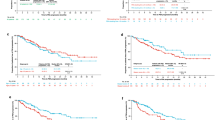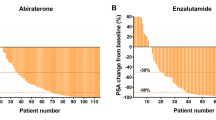Abstract
Background
Enzalutamide is a novel, non-steroidal anti-androgen that has demonstrated excellent anti-tumor activity for both non-metastatic and metastatic castration-resistant prostate cancer (nmCRPC and mCRPC) patients, and that is being rapidly introduced into clinical practice in Japan.
Objective
We retrospectively investigated the treatment efficacy, safety profile, and prognostic factors of enzalutamide over a relatively long observation period in Japanese patients with nmCRPC and mCRPC.
Patients and methods
The medical records of 184 consecutive Japanese patients with nmCRPC and mCRPC who started enzalutamide treatment in our institution between January 2012 and April 2018 were reviewed. Efficacy and safety profiles were assessed and statistically analyzed.
Results
Among these 184 patients, 44 (23.9%) nmCRPC patients, 89 (48.4%) docetaxel-naïve mCRPC patients, and 51 docetaxel-pretreated (27.7%) mCRPC patients underwent enzalutamide therapy. The median prostate-specific antigen progression-free survival (PSA-PFS) and overall survival (OS) periods for nmCRPC patients were 39.2 months and not reached; those for docetaxel-naïve mCRPC patients were 16.5 months and 59.8 months; and those for docetaxel-pretreated mCRPC patients were 7.0 months and 30.4 months, respectively. Multivariate analysis identified performance status ≥ 2, PSA > 8.89 ng/mL (median value), hemoglobin < lower limit of normal range, neutrophil to lymphocyte ratio > 3.0, and 4-week PSA decline < 50% as the predictive factors for shorter OS. Our respective prognostic models using these factors successfully demonstrated distinctly separated survival curves (p < 0.001). In addition, among these patients, 30 (16.3%) experienced adverse events and 16 (8.7%) experienced adverse events resulting in the discontinuation of therapy. Fatigue (14%) and appetite loss (7%) were the most common such events.
Conclusions
Both the survival period and risk factors were extracted from a relatively long-term observation period. Since enzalutamide was approved for administration to patients with castration-sensitive prostate cancer earlier this year (2020), we believe that the data presented here will be useful for both physicians and patients in clinical practice.


Similar content being viewed by others
References
The Editorial Board of the Cancer Statistics in Japan. CANCER STATISTICS IN JAPAN 2017. Foundation for Promotion of Cancer Research. https://www.fpcr.or.jp/.
Mottet N, Cornford P, van den Bergh RCN, Briers E (Patient Representative), De Santis M, Fanti S, et al. EAU guidelines: prostate cancer. uroweb.org/guideline/prostate-cancer/.
Kirby M, Hirst C, Crawford ED. Characterising the castration-resistant prostate cancer population: a systematic review. Int J Clin Pract. 2011;65:1180–92.
Scher HI, Fizazi K, Saad F, Taplin ME, Sternberg CN, Miller K, et al. Increased survival with enzalutamide in prostate cancer after chemotherapy. N Engl J Med. 2012;2012(367):1187–97.
Beer TM, Armstrong AJ, Rathkopf DE, Loriot Y, Sternberg CN, Higano CS, et al. Enzalutamide in metastatic prostate cancer before chemotherapy. N Engl J Med. 2014;371:424–33.
Yamasaki M, Yuasa T, Yamamoto S, Hayashi T, Ogawa M, Sakura M, et al. Efficacy and safety profile of enzalutamide for Japanese patients with castration-resistant prostate cancer. Anticancer Res. 2016;36(1):361–5.
Hussain M, Fizazi K, Saad F, Rathenborg P, Shore N, Ferreira U, et al. Enzalutamide in men with nonmetastatic, castration-resistant prostate cancer. N Engl J Med. 2018;378(26):2465–74.
Scher HI, Morris MJ, Stadler WM, Higano C, Basch E, Fizazi K, et al. Trial design and objectives for castration-resistant prostate cancer: updated recommendations from the Prostate Cancer Clinical Trials Working Group 3. J Clin Oncol. 2016;34:1402–18.
National Cancer Institute. Common Terminology Criteria for Adverse Events (CTCAE) version 4.0. https://ctep.cancer.gov/protocolDevelopment/electronic_applications/ctc.htm#ctc_40.
Fujiwara M, Komai Y, Yuasa T, Yamamoto S, Fukui I, Yonese J. Pembrolizumab for a patient with metastatic castration-resistant prostate cancer with microsatellite instability-high. IJU Case Rep. 2020;3:62–4.
Ito M, Saito K, Yasuda Y, Sukegawa G, Kubo Y, Numao N, et al. Prognostic impact of C-reactive protein for determining overall survival of patients with castration-resistant prostate cancer treated with docetaxel. Urology. 2011;78:1131–5.
Yasuoka S, Yuasa T, Ogawa M, Komai Y, Numao N, Yamamoto S, et al. Risk factors for poor survival in metastatic castration-resistant prostate cancer treated with cabazitaxel in Japan. Anticancer Res. 2019;39(10):5803–9.
Ko JJ, Xie W, Kroeger N, Lee JL, Rini BI, Knox JJ, et al. The International Metastatic Renal Cell Carcinoma Database Consortium model as a prognostic tool in patients with metastatic renal cell carcinoma previously treated with first-line targeted therapy: a population-based study. Lancet Oncol. 2015;16(3):293–300.
Kumano Y, Hasegawa Y, Kawahara T, Yasui M, Miyoshi Y, Matsubara N, et al. Pretreatment neutrophil to lymphocyte ratio (NLR) predicts prognosis for castration resistant prostate cancer patients underwent enzalutamide. Biomed Res Int. 2019;20:9450838.
Murata H, Koyama K, Takezawa Y, Nishigaki Y. Baseline neutrophil-to-lymphocyte ratio predicts the prognosis of castration-resistant prostate cancer treated with abiraterone acetate. Mol Clin Oncol. 2018;8(4):592–4.
Saito K, Kihara K. C-reactive protein as a biomarker for urological cancers. Nat Rev Urol. 2011;8(12):659–66.
Schiff JP, Cotogno P, Feibus A, Steinwald P, Ledet E, Lewis B, et al. Early prostate-specific antigen response post-abiraterone as predictor of overall survival in metastatic castrate-resistant prostate cancer. BMC Cancer. 2019;19(1):524.
Miyazawa Y, Sekine Y, Shimizu N, Takezawa Y, Nakamura T, Miyao T, et al. An exploratory retrospective multicenter study of prognostic factors in mCRPC patients undergoing enzalutamide treatment: focus on early PSA decline and kinetics at time of progression. Prostate. 2019;79(12):1462–70.
Kimura G, Yonese J, Fukagai T, Kamba T, Nishimura K, Nozawa M, et al. Enzalutamide in Japanese patients with chemotherapy-naïve, metastatic castration-resistant prostate cancer: a post-hoc analysis of the placebo-controlled PREVAIL trial. Int J Urol. 2016;23(5):395–403.
Author information
Authors and Affiliations
Corresponding author
Ethics declarations
Funding
This study was partly funded by the Smoking Research Foundation and JSPS KAKENHI Grant Number 16K11035 (TY).
Conflict of interest
T. Yuasa received remuneration for a lecture from Astellas (Tokyo, Japan). M. Fujiwara, Y. Komai, N. Numao, S. Yamamoto, and J. Yonese declare that they have no conflicts of interest that might be relevant to the contents of this article.
Author contributions
MF and TY contributed to the conception and design of the study; MF contributed to the analysis and interpretation of the data, carried out the statistical analysis, and drafted the manuscript; all authors contributed to the acquisition of data, critical revision of the manuscript, and approval of the final submitted version.
Ethics approval, consent to participate, and consent for publication
This retrospective study was conducted with approval from the institutional review board of the Cancer Institute Hospital, Japanese Foundation for Cancer Research.
Availability of data and material
Not applicable.
Code availability
Not applicable.
Electronic supplementary material
Below is the link to the electronic supplementary material.
Rights and permissions
About this article
Cite this article
Fujiwara, M., Yuasa, T., Komai, Y. et al. Efficacy, Prognostic Factors, and Safety Profile of Enzalutamide for Non-metastatic and Metastatic Castration-Resistant Prostate Cancer: A Retrospective Single-Center Analysis in Japan. Targ Oncol 15, 635–643 (2020). https://doi.org/10.1007/s11523-020-00759-1
Published:
Issue Date:
DOI: https://doi.org/10.1007/s11523-020-00759-1




